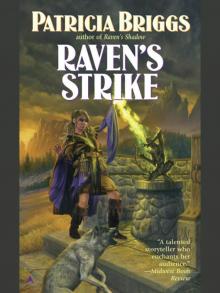- Home
- Patricia Briggs
When Demons Walk Page 2
When Demons Walk Read online
Page 2
If she’d known the names of the Old Man’s torturers at first, doubtless she would have destroyed them all, but the Old Man’s gentleness had done its work. Certainly he would be upset about what little she’d managed to do—if he ever found out.
It was enough for her that she exacted a price from them, a price they might never miss. The bad luck that would haunt them for a while was nothing akin to the pain the Old Man would suffer for the rest of his life. They would shrug it off and go on with their lives, but she would know that they had paid.
The gold she took she kept safely hidden, and soon now she would have the resources needed to buy a small farm in the country. The Old Man had been born and raised in the fields of northern Southwood and he lived in the city perforce. He had given her a reason to live after her parents had been killed when the Castle fell: This was something that she, with the unknowing help of his destroyers, could give him back.
She exited the mansion by the front door, using her magic to trip the locks behind her. Squeezing under the hedge again, she made sure that the street was deserted before completely leaving the protection of the shadows. With luck it would be months before anyone discovered the theft. She hoped no one blamed some poor servant, but that was their business and none of hers.
This time she merely waved at the guard as she trotted past him, seemingly intent on the message she carried back to her employer. By the time a week was gone, he’d never remember her at all.
She retrieved her bundle of clothing and stopped in the alley that marked the edge of the unofficial but understood border of Purgatory. Quickly she exchanged the expensive silk for worn cotton pants, a baggy shirt, and a stained leather jerkin that disguised her sex much more reliably than the courier’s garb. The undershirt, with its pockets, she left on.
For most people, walking at night in Purgatory was a dangerous proposition. But Sham’s face was known and stealing from a mage was sure to bring ill luck to the thieves. That was protection enough from the Southwood natives, who already had more bad luck than they needed.
Like the rest of the Easterners who had come after the initial attack on Southwood, the Cybellian gutter-thugs generally did not believe in magic. But they were wary enough of her skill with the knife or dagger that they didn’t attempt the well-known emptiness of her purse and pockets. If any of them had realized she was female, it might have been different.
Sham walked a while to make sure that no one followed her, casually nodding to one acquaintance and exchanging warm insults with another. As she came down the hill to the old docks, she used her magic to gather the shadows to her until they hid her from a casual glance.
It was strangely quiet at the docks without the constant murmurs that the waves usually made even in the calmest time. The sea was at Spirit Tide, leaving a mile-wide stretch of wet, debris-covered sand well below the lowest of the cliff tops.
The daily tides dropped the ocean level mere feet down the timbers of the docks and allowed only the tops of the cliffs to be exposed to the air. Only once each month did the Spirit Tide expose the pale stretch of beach for a tenth part of a day. One month it would fall during the night and the next during the day.
The support pillars of the docks rose high into the air, backlit by moonlight. The barnacles that covered them were drying for the few short hours that the tide was out. Years of salt water and tides had marred the thick wooden posts, and neglect had left the upper surface laced with missing and rotting boards.
The long expanse of beach was covered with the litter of the ocean; barrels and broken bits of refuse lay between the cracked shells and swollen remains of sea denizens. Once in a while, the broken timbers of a ship that the sea had taken would appear, only to be washed out with the next turn of the tide. Once, it was said, an ancient gold-laden vessel had washed up on the desolate weed-covered sands, and the king of Southwood had used the precious metal to form the great doors of the Castle.
Stories were told of the dead who walked the beach, searching for their loved ones to the creaking of the drying dock-timbers. There was enough truth in that to keep the beach clear of all but the most desperate slum-scavenger at night. By the light of day, the sands of Spirit Beach were fair hunting for all who were willing to fight with their fellow thugs for what treasures the sea had left behind.
When the western docks had been in use, the giant bell on the cliffs rang out as the waters began to recede, and the few ships that had chosen to race the tide would unfurl their sails and their masters would hope that they hadn’t waited too long and stranded themselves on the land where they would be destroyed by the abnormally swift, crushing waves of the ocean that reclaimed the empty bay within moments of the turning tide.
Some claimed it was magic that caused the drastic tides that depleted a bay almost four fathoms deep, but the Old Man had explained it differently. Something about the converging of deep sea currents and the great sea wall that protected this bay of Landsend, as she recalled.
It had been a long time since the bell had been rung, as the Cybellian overlords preferred the shoaly bay on the eastern side of the peninsula upon which Landsend was built. They were uncomfortable with the dangers of the Spirit Tide, and Purgatory, once a small blight in the center of the city, had quickly spread its leprous mantle to encompass the abandoned western docks. Several years earlier the heavy bell had fallen from its mounting and landed in the sea to be swallowed by the shifting ocean sands, but the frame on which it had hung was still standing.
Near the docks, higher cliff peaks rose in the air, looking far larger than they did during normal tides. Sham made her way through the rocks of the cliffs, finally lying down on her belly to reach the undercut ledge below.
From the ledge, safely hidden from view, hung a rotted ladder that owed its continued existence more to her magic than any integrity left in the wood and rope. She used the ladder to climb most of the way down the slime-coated cliffs. At the last rung she hung by her arms and dropped two body-lengths to the soft sands below.
Warily she scanned the beaches for the predators that sometimes hunted here, though it was dark enough in the shadow of the cliffs that she wouldn’t be able to see anything until it was upon her anyway. She had never discovered anything hunting here herself, but she’d come upon places where something had fed often enough that she remained cautious.
Pulling the shadows more tightly around her, she found the entrance to the cave system that riddled the ancient limestone cliffs, carved by the countless years of water pounding at the wall.
“WHAT IS THIS?” she asked, stretching to place her fingers on the edges of the runes that marked one of the openings.
Maur, his chestnut hair tinged with grey at his temples, smiled down at her. “Wards, child. To keep people out.”
She thought about it for a moment. “They’re not complete, are they?”
Pleased, the mage crouched beside her. “How would you finish them?”
She frowned at the patterns before her and traced a rune below the last one. As she finished, magic flared and she snatched her fingers back. The opening solidified until she faced a wall where a cave had been.
“Good girl,” Maur laughed. Standing up, he ruffled her hair with one hand as he unworked the wardings with another.
“Who put them there, Master?” she asked.
“Now that’s a story,” he said, leading the way into the tunnel. “I first found this cave by chance when I was a young man. Have you ever heard the stories of Golden Jo?”
She tilted her head and grinned. “Who hasn’t? There aren’t many thieves with the—” she hastily dropped the word she’d picked up from her father’s men and substituted something less shocking, “er—rashness to rob the king in his own chambers.” She paused and thought about what she’d said. “Thisis where you found the king’s lost crown?”
Maur smiled.
“I thought you did that with magic.” For a moment she was disappointed; finding the crown was touted as
proof of Maur’s powers throughout Southwood.
“Magic,” replied Maur, tapping on the runes, “—wit, and a little luck are always more powerful than magic alone. Remember that. I also found the remains of Golden Jo next to the crown; not much left of him after all these years. It looked like he took too much time storing the crown and got trapped in the cave. From the scorch marks in the cave and on the bones, I’d say that he tried to teleport and drew more magic than he could handle—the Spirit Tide’s funny that way sometimes. All in all it’s a better way to go than dying of thirst.”
“He had luck and magic,” said Sham slowly, “but his wits were lacking if he trapped himself here.”
Maur nodded. “You remember that, child. Never trust to any one of the three: And don’t stay in the caves too long.”
ONCE THROUGH THEmouth and several steps into the cave beyond, she called her magelight. By its illumination she worked her way upward through the damp tunnels until she passed the high-tide mark. The small grotto where she kept her treasures was well above the highest mark the water had made.
She stored the coins in the oiled-leather pouch with the considerable pile she had already amassed. There were other things in the cave, too. She knelt and loosened one of the oilcloths that protected her treasures from dampness. When she was finished, she held a small footstool.
LARGE FEET ENCASEDin neatly darned damp woollen socks rested on the battered footstool near the fire in her father’s office. The warmth caused a faint mist to rise from the wool as her father wiggled his toes and set aside the crumb-covered wooden platter.
His blond hair, the same shade as her own, was caught back by a red ribbon from her mother’s favorite gown. His chainmail shirt, which he had not taken off, was the best of its kind, as befitted the captain of the King’s Own Guards. Over the metal links he wore a wine-colored velvet surcoat, one arm torn where a sword had parted the cloth. Beneath the tear, she could see the stained edge of a bandage.
“Thank you, my dear, though I didn’t expect to see you. I thought the sorcerer had you tied up with his work.”
Shamera grinned. “Maur released me from my apprentice duties today at the king’s request as Mother is needed soothing and terrifying the ladies of the court into behaving.”
Her father laughed and shook his head. “If anyone can keep those hens in line it’s Talia. Nothing is worse during a siege than a bunch of helpless ladies twittering and—”
His words were interrupted by the call of a battle horn. Her father’s face paled, and his mouth turned grim.
He grabbed her by the shoulders and said hoarsely, “You find someplace—one of the tunnels the children play in—someplace safe and you go there now! Do you understand?”
Terrified by the fear in her father’s face, Shamera nodded. “What’s wrong?”
“Do as I ask,” he snapped, drawing on his boots and reaching for his weapons. “You go hide until I come for you.”
He never came.
GENTLY, SHAM WRAPPEDthe oilcloth around the footstool and set it aside. The next bundle she unwrapped was considerably larger—a small, crudely made chest. She lifted the lid and revealed its contents. She set aside a faded scarlet ribbon, miscellaneous bits of jewelry, a palm-sized ball of glass the Old Man had used to keep his hands limber, and a pillow embroidered neatly with stars and moon—her last attempt at needlework.
Under the pillow was another wooden box. This she took in her lap and unworked the magic that kept the lid closed. Inside were several items that she’d found while thieving. They weren’t hers or the Old Man’s, but like the flute they were better stored well out of the reach of fools: a gold and porcelain bowl that would gradually poison any who ate from it, a worn silver bracelet that kept the wearer from sleeping, and several like items. She started to put the flute with them, then stopped.
The Old Man had nothing left from before—nothing but the flute she held in her hand. The farm would have to wait until she had the money, but the flute she would give to him now. She returned it to her hidden pocket. As she did so, she felt the surge of magic that preceded the return of the tide.
She forced herself to set the seal on the larger chest carefully, but once that was done she rewrapped the oilcloth with haste and left the grotto at a dead run. Slipping and sliding she sped through the tunnels to the beach outside. Far out on the sands she could see the white line of the returning sea.
The sand was soft with water and sucked at her fleeing feet, causing her to stumble and slow. The short distance to the ladder seemed to stretch forever and the sands began to vibrate. By the time she’d reached the cliff below the ladder she could hear the roar of the ocean.
The cliffside was slick with moisture and without the thread of magic that kept her fingers from slipping off the rocks she would never have reached the ladder.
“Magic,” she gasped as her fingers closed over the bottom rung of the ladder, “—and luck to make up for lack of wits—I hope.”
But there was no time to waste, if the wall of water hit while she was still on the ladder she would be crushed against the rocks. The ladder shook with the force of the returning water and she increased her efforts, ignoring the burning in the muscles of her arms and thighs.
The wind hit first, battering her against the hard rock cliff, and she spared a glance for the racing wall of water. As tall as the cliff she climbed, the foaming white mass covered the sands faster than a racing horse, the drumming of the surf echoing the beat of her heart. She couldn’t help the wide grin that twisted her mouth as she fought to climb beyond the waves reach. The exhilaration of her race for survival helped add speed to her ascent.
Heart pounding, she threw herself on the top of the low cliff where her ladder attached, then turned to watch the tremendous waves that swept across the last few yards of sand. The noise was incredible, so strong that she could feel it thrumming in her chest, and she breathed in deeply to savor the feeling.
She jumped back involuntarily as the ocean crashed into the cliff with a hollow boom that shook the ground and sent spray high into the air. Laughing, she ducked her head to protect her eyes, and the salt water showered harmlessly onto her hair and shoulders as the waves retreated and pounded back again.
Magic poured over her, making her heart sing with the joy of it. It was shaped and called by the ocean itself, and no human mage could use its power to weave spells—but she could feel it and revel in its glory.
She wasn’t certain what made her turn away from the waves, but she froze when she saw that someone else was watching the water hit the cliffs. He hadn’t seen her where she crouched on her hidden ledge below him. The crashing waves were deafening, drowning any sound she had made. If she stayed where she was she could probably keep him from noticing her at all. But the water’s magic made her reckless. She slid further toward the edge of her ledge, allowing herself to get a better look at the rider who dared Purgatory at night to see the Spirit Tide.
Unlike Sham, the man was in the open, clearly visible in the silver moonlight. A Cybellian warrior, she thought, outfitted with surcoat, sword, and war horse.
For a disorienting instant terror choked her as she stared at him from the shadows, seeing not a lone man but the bloody warriors who had taken the Castle. The past was too close to her this night. She swallowed the lump in her throat and ran her hands across various weapons hidden on her person. Thus reassured, she took a closer look at him.
The chainmail shirt that extended past his surcoat at wrists and throat was of the highest quality, the links so fine that it appeared to be fashioned of cloth rather than metal. The surcoat itself was of some dark color. He was facing slightly away from Sham, and she couldn’t make out the device on its front. A wealthy warrior then, and a fool.
It had been a long time since she had been the daughter of the captain of the guards at the Castle, but not so long that she’d forgotten how to judge a horse. She ran an assessing eye over this one, an aristocrat from the flared nostril
s to the long, dark hair that covered his legs from knees to hooves. Only a fool would take such an obviously valuable animal through Purgatory at night.
The stallion snorted and sidled as he caught her scent in the salt air. He rolled his eyes until the white showed and shook his wet mane fiercely. The impulse to stay hidden came and went unheeded. The warrior was the outsider here; she had no reason to avoid notice.
With a nearly invisible signal from his rider, the horse spun around on its haunches as the man looked for the cause of the horse’s unease. The stallion blew spray of his own as he snorted impatiently and completed a full circle, giving Sham her first view of the man’s coat-of-arms.
At the sight of the silver and gold leopard emblazoned on the silk she whistled soundlessly and altered her assessment of the man. Wealthy warrior he was indeed, but not a fool. Even the most formidable group of thugs would hesitate to attack the Leopard of Altis, Reeve of Southwood.
Lord Kerim, called the Leopard, ruled most of Southwood in the name of the Voice of Altis and the Cybellian Alliance that the Voice ruled. At the tender age of eighteen the Leopard had led an elite fighting unit to spearhead the invasion through the Great Swamp and across a fair portion of the lands between the Swamp and the Western Sea. People still talked in whispers at the cunning and skill that he’d displayed.
Eight years ago, when the Cybellians had snuffed out all but a hint of rebellion in Southwood, the Voice of Altis had called upon Kerim to become his Reeve, answering only to the prophet himself.
Kerim had been less than a quarter of a century old when he’d taken control of Southwood, and turned it back into a thriving country. With a mixture of bribery and coercion he had made the Southwood nobles and the Cybellians cooperate with each other—resorting to force only once or twice.

 Wolfsbane
Wolfsbane When Demons Walk
When Demons Walk Cry Wolf
Cry Wolf On the Prowl
On the Prowl Iron Kissed
Iron Kissed Hunting Ground
Hunting Ground Patricia Briggs Mercy Thompson: Hopcross Jilly
Patricia Briggs Mercy Thompson: Hopcross Jilly Burn Bright
Burn Bright Silver Borne
Silver Borne Storm Cursed
Storm Cursed Shifting Shadows
Shifting Shadows Frost Burned
Frost Burned River Marked
River Marked Silence Fallen
Silence Fallen Fair Game
Fair Game Moon Called
Moon Called Fire Touched
Fire Touched Dead Heat
Dead Heat Blood Bound
Blood Bound Dragon Bones
Dragon Bones Night Broken
Night Broken The Hobs Bargain
The Hobs Bargain Ravens Shadow
Ravens Shadow Ravens Strike
Ravens Strike Storm Cursed (A Mercy Thompson Novel)
Storm Cursed (A Mercy Thompson Novel) Bone Crossed
Bone Crossed Dragon Blood
Dragon Blood Smoke Bitten: Mercy Thompson: Book 12
Smoke Bitten: Mercy Thompson: Book 12 Smoke Bitten
Smoke Bitten Steal the Dragon
Steal the Dragon 0.5 On The Prowl (alpha and omega)
0.5 On The Prowl (alpha and omega) Alpha and Omega
Alpha and Omega Raven's Strike rd-2
Raven's Strike rd-2![[Mercy 03] - Iron Kissed Read online](http://i1.bookreadfree.com/i/03/24/mercy_03_-_iron_kissed_preview.jpg) [Mercy 03] - Iron Kissed
[Mercy 03] - Iron Kissed Raven's Shadow rd-1
Raven's Shadow rd-1 Frost Burned mt-7
Frost Burned mt-7 Dragon Bones h-1
Dragon Bones h-1 Shifting Shadows: Stories from the World of Mercy Thompson
Shifting Shadows: Stories from the World of Mercy Thompson Silver Borne mt-5
Silver Borne mt-5 Wolfsbane s-2
Wolfsbane s-2 Dragon Blood h-2
Dragon Blood h-2 Iron Kissed mt-3
Iron Kissed mt-3 Fair Game aao-3
Fair Game aao-3 Masques s-1
Masques s-1![[Hurog 01] - Dragon Bones Read online](http://i1.bookreadfree.com/i1/04/03/hurog_01_-_dragon_bones_preview.jpg) [Hurog 01] - Dragon Bones
[Hurog 01] - Dragon Bones Raven s Strike
Raven s Strike Mercedes Thompson 03: Iron Kissed
Mercedes Thompson 03: Iron Kissed Bone Crossed mt-4
Bone Crossed mt-4 Blood Bound mt-2
Blood Bound mt-2![[Mercy 01] - Moon Called Read online](http://i1.bookreadfree.com/i2/04/09/mercy_01_-_moon_called_preview.jpg) [Mercy 01] - Moon Called
[Mercy 01] - Moon Called River Marked mt-6
River Marked mt-6 The Mercy Thompson Collection
The Mercy Thompson Collection Moon Called mt-1
Moon Called mt-1 Mercy Thompson 8: Night Broken
Mercy Thompson 8: Night Broken